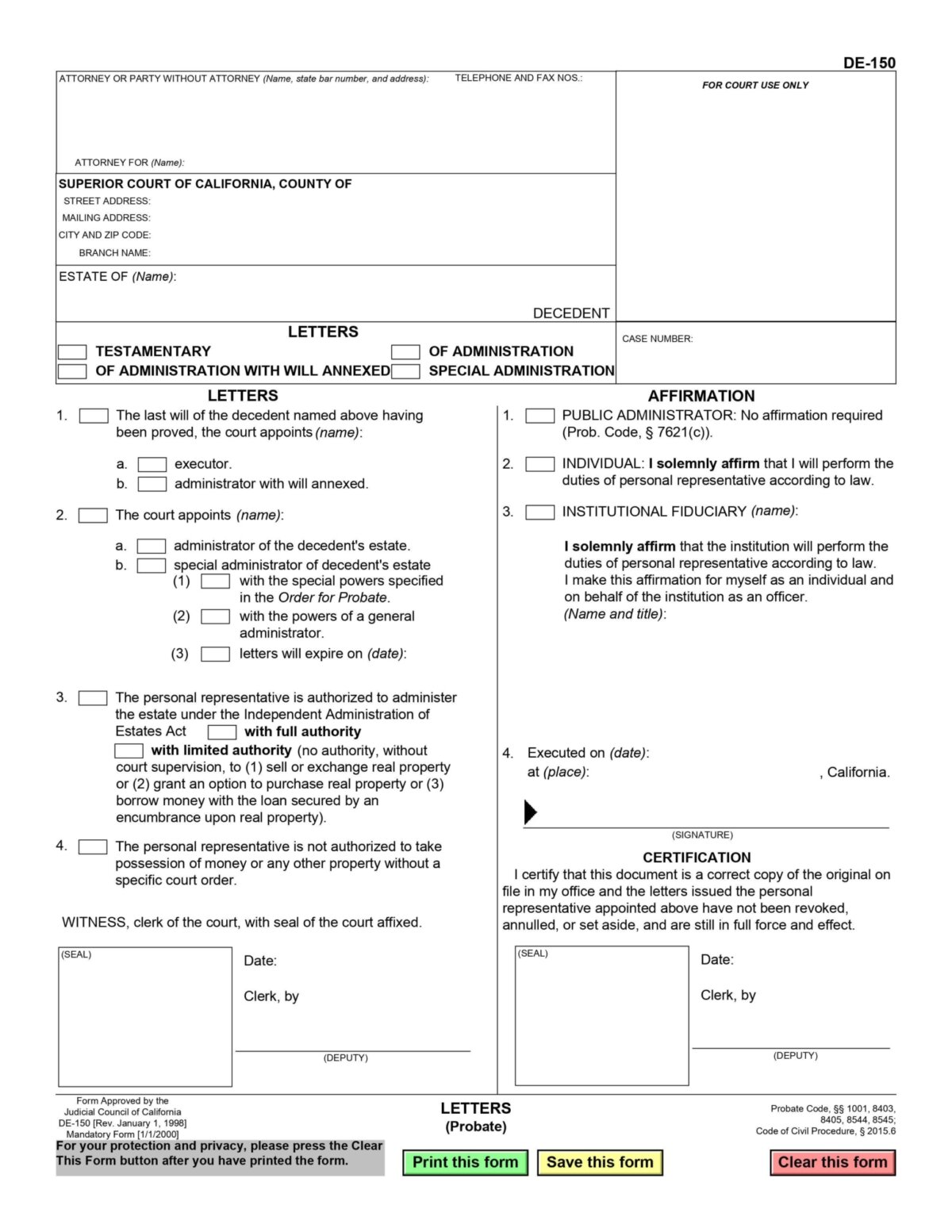Estate Settlement
May 01, 2025
What to Do When Someone Dies in California
Follow this step-by-step guide to navigate legal duties, probate, and estate tasks with clarity and confidence.
Obtaining a letter of administration is one of the first things a personal administrator should do when settling an estate, here's what you need to know about them.


Article Contents
Settling the estate of a loved one is hard, but settling an estate without a will - otherwise known as an intestate estate, makes it even harder.
To begin settling an intestate estate, the personal representative must file for a letter of administration before they can begin filing for probate.
Obtaining a letter of administration is the first step for a personal administrator to take when it comes to settling the estate.
This process can be complicated, and certain requirements must be met in order to be eligible.
Here's what you need to know about obtaining letters of administration in California:
Issued by the California probate court, Letters of Administration is a document that personal administrators use to officially provide proof of their authority to act on behalf of a deceased person’s estate.
Letters of administration are required for handling the affairs of the deceased who died without a will, otherwise known as dying "intestate".
In order of priority, the following persons are authorized to receive a Letter of Administration:
To start the process of obtaining a letter of administration, you must fill out Form DE-150.
The completed form DE-150 should then be submitted to the probate court in the county in which the deceased resided in at the time of death.
Once approved and signed by the probate court judge, you will be ready to move forward, taking the necessary steps to administer the estate.

Prior to submitting the DE-150, be sure to secure a copy of the decedent’s death certificate that will subsequently be submitted to the court.
This can usually be obtained from the funeral home; and now would be a good time to request a few extra copies, as you may need them further down the road in this process. The original certificate will need to be submitted to the probate court, along with your DE-150 application.
Your next step is to develop a list of relatives who should be made aware of your official capacity as personal representative for the estate.
You may already know these family members, but they and any other potential heirs need to be contacted directly by you.
Obtaining as much financial information as possible about the decedent comes next, as it is imperative that you know what assets and debts have been left to deal with.
Some financial institutions may be unwilling to provide you with information until the Letters of Administration have been approved, but you should still be able to gather information about bank accounts, mortgages, property, credit cards, loans, stock or mutual fund investments, and any life insurance policies.
The probate court will accept estimates if you are unable to advise exact dollar amounts at this time. Be prepared, as well, to provide any tax forms that are required to be attached to the request for Letters of Administration.
You are now ready to file the DE-150 application with the county court where the deceased resided at the time of death.
To be a personal representative of an estate in California: you must be at least 18 years of age, a U.S. citizen, and cannot have a criminal record with felony convictions.
It isn’t unusual for some third parties to require proof of your authority to act on behalf of the deceased.
Having obtained ‘Letters’ you now have this proof, so you shouldn’t run into difficulty when needing to speak with or collect information about various accounts that the decedent possessed.
Your needs may run the gamut from collecting assets, to cancelling accounts and paying estate expenses. Banks, state and federal tax authorities, financial management firms, life insurers, mortgage companies, trustees, and the Department of Motor Vehicles (DMV), will now be more forthcoming in providing the information you are seeking.
Be aware that it may take four to six weeks before your application receives approval, depending on how busy the county probate court is at the time of filing.
However, the probate process, which typically lasts at least four months, and often longer, has begun.
To put it simply, no, Letters of Special Administration and Letters of Administration are not the same.
While the personal administrator is working to pull together all that is required for the DE-150 application to be submitted, they may need to request probate court authorization for certain limited acts on behalf of the estate to move forward.
This is particularly acute if there are assets of the deceased that may need to be protected. Letters of Special Administration are also accessed for quicker approval of permanent administration powers in the event of a contested Will.
These ‘Letters’ are for short-term situations that need to be managed prior to the Letters of Administration approval by a judge. Examples of this would be the transfer of an asset, such as a motor vehicle, to an heir that requires the vehicle ownership to be transferred as quickly as possible.
If the decedent sold real property and opened an escrow but died before it could be closed, letters of special administration may also need to be issued.
Payment of a specific bill may also be authorized using this quicker appointment, denoting an urgency that the court has examined and expressed concurrence.
To note; the powers of a special administrator no longer stand if the court has issued letters of administration to a personal representative or otherwise given a court order.
- The first step a personal administrator should take is to file for a letter of administration using the DE-150 form.
- The letter of administration legally provides the personal administrator authority to settle the estate of the deceased.
- Letters of special administration are usually required under "special" circumstances; the estate requires an immediate personal representative, the estate requires time-sensitive administration.
If you need help settling an intestate estate in California, our team can assist you. We have the experience and resources to make the process as smooth and stress-free as possible for all involved.
Contact us today for more information or to get started on the process.
 Simplify Probate Today
Simplify Probate Today
Get expert guidance from our specialists who've helped 10,000+ families.
Book a free consultation